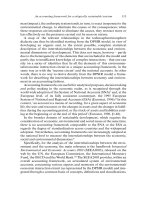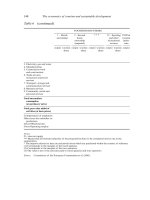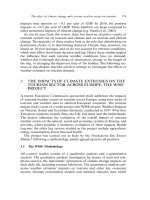THE ECONOMICS OF MONEY,BANKING, AND FINANCIAL MARKETS 365
Bạn đang xem bản rút gọn của tài liệu. Xem và tải ngay bản đầy đủ của tài liệu tại đây (39.24 KB, 1 trang )
CHAPTER 13
Banking and the Management of Financial Institutions
333
Collateral and
Compensating
Balances
Collateral requirements for loans are important credit risk management tools.
Collateral, which is property promised to the lender as compensation if the borrower defaults, lessens the consequences of adverse selection because it reduces
the lender s losses in the case of a loan default. It also reduces moral hazard,
because the borrower has more to lose from a default. If a borrower defaults on
a loan, the lender can sell the collateral and use the proceeds to make up for its
losses on the loan. One particular form of collateral required when a bank makes
commercial loans is called compensating balances: A firm receiving a loan must
keep a required minimum amount of funds in a chequing account at the bank. For
example, a business getting a $10 million loan may be required to keep compensating balances of at least $1 million in its chequing account at the bank. The
$1 million in compensating balances can be taken by the bank to make up some
of the losses on the loan if the borrower defaults.
Besides serving as collateral, compensating balances help increase the likelihood
that a loan will be paid off. They do this by helping the bank monitor the borrower
and consequently reduce moral hazard. Specifically, by requiring the borrower to
use a chequing account at the bank, the bank can observe the firm s cheque payment practices, which may yield a great deal of information about the borrower s
financial condition. For example, a sustained drop in the borrower s chequing
account balance may signal that the borrower is having financial trouble, or account
activity may suggest that the borrower is engaging in risky activities; perhaps a
change in suppliers means that the borrower is pursuing new lines of business. Any
significant change in the borrower s payment procedures is a signal to the bank that
it should make inquiries. Compensating balances therefore make it easier for banks
to monitor borrowers more effectively and are consequently another important
credit risk management tool.
Credit
Rationing
Another way in which financial institutions deal with adverse selection and moral
hazard is through credit rationing: refusing to make loans even though borrowers are willing to pay the stated interest rate or even a higher rate. Credit rationing
takes two forms. The first occurs when a lender refuses to make a loan of any
amount to a borrower, even if the borrower is willing to pay a higher interest rate.
The second occurs when a lender is willing to make a loan but restricts the size
of the loan to less than the borrower would like.
At first you might be puzzled by the first type of credit rationing. After all, even
if the potential borrower is a credit risk, why doesn t the lender just extend the
loan but at a higher interest rate? The answer is that adverse selection prevents this
solution. Individuals and firms with the riskiest investment projects are exactly
those that are willing to pay the highest interest rates. If a borrower took on a highrisk investment and succeeded, the borrower would become extremely rich. But
a lender wouldn t want to make such a loan precisely because the credit risk is
high; the likely outcome is that the borrower will not succeed and the lender will
not be paid back. Charging a higher interest rate just makes adverse selection
worse for the lender; that is, it increases the likelihood that the lender is lending
to a bad credit risk. The lender would therefore rather not make any loans at a
higher interest rate; instead, it would engage in the first type of credit rationing
and would turn down loans.
Financial institutions engage in a second type of credit rationing to guard
against moral hazard: They grant loans to borrowers, but not loans as large as the
borrowers want. Such credit rationing is necessary because the larger the loan,
the greater the benefits from moral hazard. If a bank gives you a $1000 loan, for









